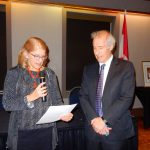OP/ED: A passage without ice
Nicolas Peissel is a self-described “methodical” person.
The 35-year-old Montrealer inherited his sea-faring skills honestly, having grown up on a farm where his parents spent the better part of 10 years building a sailboat to live out their dreams.
A decade of work as a shipwright gave Nicolas the opportunity to sail all sorts of boats in different locations around the world such as Indonesia, Malaysia, Thailand, Sweden, France, United Kingdom, Spain, Portugal, Africa, Caribbean and Americas.
“I like challenges and feel that I am resourceful and adapt very well to new situations and difficult circumstances,” says Nicolas in a self-written biography.
That resourcefulness, adaptability, and orderliness of Nicolas’ character got the supreme test during his latest adventure.
Nicolas, his cousin Morgan Peissel from Boston, and Edvin Buregren from Varberg, Sweden have just sailed a 9.4 metre (31-foot) fibreglass sailboat through the Arctic achieving the most northern Northwest Passage ever accomplished by a sailboat.
The trio aboard the Belzebub II navigated through McClure Strait, the northernmost waterway on the edge of the Canadian Northwest Territories.
It was the first time that a vessel other than an icebreaker had breached the passage.
The voyage took them from Newfoundland to Greenland and through the Canadian Arctic, on their quest to document the rapidly dwindling polar ice and to bring awareness to the effects of global warming.
Their expedition was supported by the Royal Canadian Geographical Society and a number of corporations.
An attempt to shift attitudes
“By sailing this newly-opened route we hope that our expedition will play a small part in bringing further attention to climate change and contributing to a larger shift in attitudes,” the crew wrote on their website http://belzebub2.com/.
“The Arctic is melting at an alarming rate and is clear proof of our disharmony with the planet,” they wrote. “Our approach to sail across a historical stretch of water that has traditionally been frozen is meant to be a clear visual example of the extent of declining polar ice.”
Nicolas and Edvin hatched the idea to sail the Northwest Passage two years ago and spent many hours poring over ice charts and satellite images of the fabled corridor that has drawn explorers for centuries seeking a route from the Atlantic to the Pacific.
The Northwest Passage – and McClure Strait in particular – has historically been virtually impassable because it was covered in ice, but the warming Arctic climate has made such trips possible. The McClure Strait became ice-free in early August 2007, and again in August 2008.
“There’s no reason why we should have been able to do that,” Nicolas said over satellite phone in an interview with the Montreal Gazette. “This is a clear signal that there’s climate change.
The Arctic is the canary in the cage
“The ice caps contain millions upon millions of litres of fresh water that are melting into our oceans,” he said. “The Arctic is the canary in the cage that tells us what’s happening to the rest of the world.”
Explorers including Martin Frobisher and Henry Hudson have tried to find a route through the Northwest Passage but failed. In 1845 a two-ship expedition led by Sir John Franklin disappeared with all its 129 crewmen while attempting to find the passage. An expedition led by Parks Canada is currently searching for the remains of Franklin’s two ships, the Erebus and the Terror.
Most Canadians probably know about Franklin through the lyrics of Stan Rogers’ much-loved folk song Northwest Passage which describe “the hand of Franklin reaching for the Beaufort Sea” and “tracing one warm line through a land so wild and savage”.
Rogers, who composed the song in 1981, would have had no inkling at the time how prophetic his words about the “one warm line” would be, or that it would be traced by climate change not Franklin.
This year, following the new record low recorded on August 26, Arctic sea ice extent continued to drop and is now below 4.00 million square kilometres (1.54 million square miles). Compared to September conditions in the 1980s and 1990s, this represents a 45 percent reduction in the area of the Arctic covered by sea ice.
Belzebub II a recreational boat
The Belzebub II is the type of craft one would sail on Kootenay Lake. “If we get hit by a piece of ice, it will put a gaping hole into the boat,” Nicolas said.
On the journey, the sailboat and its crew encountered 55-kilometre-an-hour winds, fog, and waves that crested at four metres. Waves, Nicolas said, packed with sharp pieces of ice.
When the Belzebub II reached Parry Channel, the long waterway that leads to the McClure was iced over. The Canadian Ice Service sent an updated ice map and a warning: do not attempt the cross as ice from the north is pushing down on the strait.
“But it was our only window. So we made decision to push through. We wrote them back and said ‘thank you, we understand the risks. Please provide us with updates for the next 48 hours,’ ” Nicolas said.
And for the next 48 hours, the crew did not sleep. They sailed a narrow passage along Banks Island, rock on one side, sea ice on the other. At any time the ice could surround and trap them, as it did to the strait’s namesake, Robert McClure, in the 1850s.
A dream come true
Now that a two-year dream has been realized, Nicolas and his crewmates are filled with excitement and exhilaration.
“After an extended period in the high Arctic where fresh vegetables, fruits and a cold beer were either next to impossible to find, too expensive or illegal we have an insatiable craving for all that we intend to satisfy,” Nicolas writes on the expedition’s website.
While the Belzebub II crew enjoy a well-deserved indulgence, the rest of us should heed the warning to take the march of climate change seriously and explore solutions as methodically as Nicolas approached his historic accomplishment .
Michael Jessen is a Nelson-based energy specialist and owner of the consultancy Zero Waste Solutions. He is also the energy critic for the Green Party of BC and can be reached by email at zerowaste@shaw.ca
RESOURCES
Track the voyage of the Belzebub II at http://belzebub2.com/?lang=en
A video about the voyage can be viewed at http://www.rcgs.org/programs/expeditions/2012_passage_through_arctic.asp
The National Snow & Ice Data Center in Boulder, Colorado provides year-round scientific analysis and daily image updates of Arctic sea ice at http://nsidc.org/
























